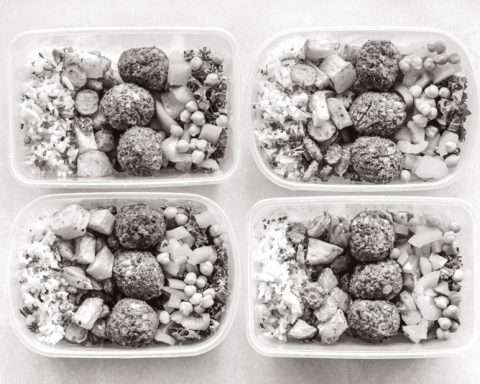In today’s fast-paced world, prioritizing your health while managing work, family, and personal responsibilities can feel like an uphill fight. With numerous to-do lists and limited hours in the day, it’s easy to choose convenience above nutrition. However, disregarding what you eat does more harm than good.
When you’re short on time, it’s tempting to choose quick alternatives like greasy fast food and sugary energy drinks. But as you probably know already, that’s not healthy at all. Don’t worry — you don’t have to sacrifice nutrition for convenience. Smart meal planning lets you maximize nutrition with minimal effort while maintaining a balanced diet without stress.
By mastering a few simple meal planning techniques, you can prepare quick, easy, healthy meals that fit effortlessly into your hectic schedule. This article will walk you through sensible meal-planning approaches that save time while maximizing nutrition.
Implement these simple principles below to maintain a balanced diet with minimal effort. It’s time to embrace a better lifestyle through wise planning!
What is smart meal planning?
Smart meal planning focuses on preparing easy, healthful meals while saving energy and effort. It’s more than meal prep or batch cooking; it’s a holistic approach to food organization that considers flexibility, nutritional balance, and efficiency.
While batch cooking and meal prep are essential approaches to smart meal planning, the discipline is more than that. It involves creating a personalized strategy based on your lifestyle and goals.
Batch cooking is making big quantities of a single meal and dividing it into pieces for later use, which saves time. Meal preparation, on the other hand, focuses on pre-packaging ready-to-eat or easy-to-assemble meals for certain days, such as setting aside containers with pre-chopped components for salads or stir-fries.
Smart meal planning expands these by incorporating strategic planning and flexibility.
For example, rather than depending exclusively on repeating meals from batch cooking, wise meal planning considers nutritional diversity. It maintains a mix of proteins, carbohydrates, and vegetables throughout all meals.
It also allows for last-minute alterations, such as switching ingredients if you run out of something or accommodating an unplanned supper without wasting food. Thus, it reduces the monotony that frequently discourages people from batch cooking or meal prepping while maintaining all their benefits.
The benefits of smart meal planning
Research shows that people who plan their meals ahead of time are more likely to follow a healthy diet, decrease food waste, and save money.
Smart meal planning provides a clear path to simple and healthy meals, allowing you to focus on what matters most while also fueling your body.
In a sample of 57.4% of individuals who claimed to plan their meals at least occasionally, researchers discovered that meal planners were more likely to keep to balanced diets (i.e., consuming multiple nutrient-rich foods, such as fruits, vegetables, whole grains, lean proteins, and healthy fats) than non-planners.
Interestingly, while 84% of Canadians feel that meal preparation saves time, 40% continue to make last-minute food selections. However, 86% agreed that creating a weekly menu guarantees better nutrition for the entire family.
These figures highlight how wise meal planning is time-saving while simultaneously increasing nutrition, allowing you to maintain simple and nutritious meals easily. But it doesn’t end there – smart meal planning has deeper benefits, which will be discussed below.
Reduces stress and decision fatigue
Planning meals ahead of time reduces the daily mental burden of determining what to eat, making mealtime more pleasurable and less stressful. This saved mental energy can be used for other tasks, increasing total productivity.
For example, decision fatigue frequently results in impulsive, less healthy food later in the day. Smart meal preparation makes healthier alternatives easily available, minimizing the temptation to choose convenient meals during stress or weariness.
Improves nutrition and supports health goals
Meal planning enables you to prepare balanced, nutrient-dense meals suited to your unique dietary requirements.
Smart meal planning keeps you on track, whether managing allergies, following a vegetarian or gluten-free diet, or pursuing particular health objectives such as weight loss, low-sodium eating, or a low-carb routine.
Having a plan minimizes the probability of eating unhealthy, impulsive meals. For example, those who plan their meals eat more vegetables, fruits, and lean meats, contributing to better long-term health. Planning ahead of time also allows you to diversify your meals, making it simpler to continuously satisfy your body’s nutritional needs.
Saves time and money
On hectic days, incorporating batch cooking and pre-prepping strategies significantly minimizes cooking time. These strategies appear effective while saving time and providing healthy, nutritious meals with minimal effort.
For example, investing an hour on the weekend in ingredient preparation, such as cutting vegetables or cooking grains, can save important minutes on midweek meal prep, making evening cooking faster and less stressful.
Furthermore, meal planning is a cost-effective strategy. By making a thorough shopping list based on your strategy, you may avoid purchasing unnecessary things and take advantage of bulk purchases or discounts. Meal planners waste substantially less food and environmental resources than non-planners.
This strategy results in significant cost savings over time while also helping you adhere to a budget.
Read more: How to Meet Nutritional Needs Despite a Busy Schedule
Smart meal planning techniques
Smart meal planning is more than just organizing your meals; it’s about getting the most nutrition for the least amount of work.
Understanding the physics behind meal planning saves time while making healthy meals. Whether you’re searching for quick lunch ideas or light dinners after a long day, these tips can help you create balanced, simple, and healthy meals with ease.
Here are some important smart meal-planning practices:
Batch cooking for easy, nutritious meals
Batch cooking is a game changer for making simple, nutritious meals with minimal effort.
Cooking large amounts ahead of time and storing them for later use ensures that quick, wholesome meals are always available. This method is also ideal for preparing quick snacks for the evening or meals on hectic days.
Nutritious meals are only a heat-up away, thanks to batch cooking. Here’s how to start batch cooking:
- Plan your meals. Begin by choosing the meals you want to make for the week. Consider adaptable and easily portioned meals such as soups, stews, stir-fries, or grain bowls. Shop smart and buy in bulk to save time and money.
- Make in batches. Set aside a few hours to prepare many meals at once. Use big pots, pans, or slow cookers to make meals more effective.
- Properly portion and store your meals. Separate the food into portions. Use airtight containers for quick grab-and-go meals or family-sized containers for bigger dinners. Label containers with the contents and date. Refrigerate what you’ll eat in the coming days and freeze the rest.
- Reheat meals safely. When ready to eat, reheat them to the appropriate temperature. Add fresh greens, herbs, or garnishes to boost flavor and nutrition.
Read more: The Minimalist Meal Prep: Slash Food Waste and Save Time
Utilizing efficient kitchen appliances
Efficient kitchen gadgets save you time and effort. These gadgets let you cook nutrient-dense meals without spending hours in the kitchen, making it easier to follow a balanced diet. These appliances preserve and enhance nutrition value in certain ways:
- Slow cookers. Cooking at low, steady temperatures preserves water-soluble vitamins such as B and C, which can be lost using high-heat procedures. This moderate cooking method also helps to break down tough fibers in vegetables, making nutrients more accessible.
- Pressure cookers. By cooking food fast under high pressure, these machines save cooking time and limit the loss of heat-sensitive nutrients such as folate and vitamin C. They are also effective at preserving the nutritional content of legumes and grains.
- Blenders. Unlike juicing, which can remove fiber, blending fruits and vegetables preserves all of their fiber and minerals. Blenders are perfect for making nutrient-rich smoothies and soups.
- Air fryers. Air fryers are a healthier alternative to deep frying, allowing you to cook crispy foods with less oil.
- Food processors. They quickly chop, slice, and dice ingredients, minimizing meal prep time.
- Instant pots. Combine the capabilities of a pressure cooker, slow cooker, and other appliances to provide more food preparation options.
Prepping ingredients ahead of time
Advanced preparation is a simple but efficient way to alleviate stress at mealtimes and make cooking less of a hassle. Planning and preparing meal components ahead of time allows you to simplify your daily routine and enjoy the process rather than rush through it. These preparatory actions not only save time but also make it easy to prepare simple, nutritious meals throughout the week with little effort. For instance,
- Pre-chop vegetables. Preparing vegetables for stir-fries, soups, and salads beforehand saves time on hectic weekdays and improves cooking efficiency.
- Marinate proteins ahead of time. Marinating chicken, fish, tofu, or other proteins saves time and improves flavor, ensuring that your meals are both quick and tasty.
- Portion snacks. Divide foods into grab-and-go quantities, such as almonds, apples, or sliced veggies, for handy, healthful alternatives on the move.
Having supplies on hand makes everything go more smoothly. You can even prepare simple snacks to eat at night for a fast grab-and-go meal. With a bit of planning, easy lunches and snacks are always available, making your week less stressful.
Creating simple, balanced meal plans
Creating simple, balanced meal plans is essential for maintaining a healthy diet while not feeling overwhelmed in the kitchen. An effectively organized meal plan lets you prioritize clean, nutrient-dense foods while retaining control and balance in your daily routine.
It guarantees that you have a diverse range of meals that suit your nutritional requirements and keep your taste senses engaged and satisfied. To guarantee balance and nutrition, incorporate at least one protein source, a dish of healthy grains, and a big piece of veggies into each meal.
Therefore, planning ahead of time allows you to combine various items that supply critical nutrients without relying on complicated recipes or long cooking periods. This technique lays the groundwork for preparing comprehensive and balanced meals that nourish the body and mind.
Prioritizing easy snacks and meal ideas
Prioritizing simple snacks and meal ideas can significantly impact your busiest days, keeping you energized, focused, and less tempted by bad alternatives. Here are some quick and healthy options that are easy to prepare and give a balanced range of nutrients:
- Overnight oats. Mix oats, milk (or a dairy-free equivalent), and toppings such as fresh fruit, nuts, and seeds. This make-ahead option is rich in fiber and protein, making it ideal for a quick breakfast or snack.
- Smoothie bowls. Combine fruits and vegetables with a scoop of protein powder or Greek yogurt. For a versatile and nutrient-dense snack, top with granola, chia seeds, or fresh berries.
- Simple wraps. Fill whole-grain wraps with lean proteins (like chicken or tofu), colorful vegetables (like spinach and bell peppers), and dips like hummus or avocado. These wraps are easy to make and packed with protein, fiber, and healthy fats.
In conclusion
Smart meal planning is an effective tool for busy people who want to prioritize their health without spending hours in the kitchen. You can make nutritious meals with little effort by adopting tactics such as batch cooking, efficient kitchen appliances, and creating balanced meal planning.
With a little planning, you’ll have simple lunch ideas and snacks to energize you and ensure that healthy alternatives are always available. Use these ideas today to enjoy stress-free, nutritious eating that matches your lifestyle.
If you would like to see more resources on meal planning, check out the Household Management Science Labs. The lab uses the research of the Institute for Life Management Science to produce courses, certifications, podcasts, videos, and other tools. Visit the Household Management Science Labs today.
Photo by Freepik



